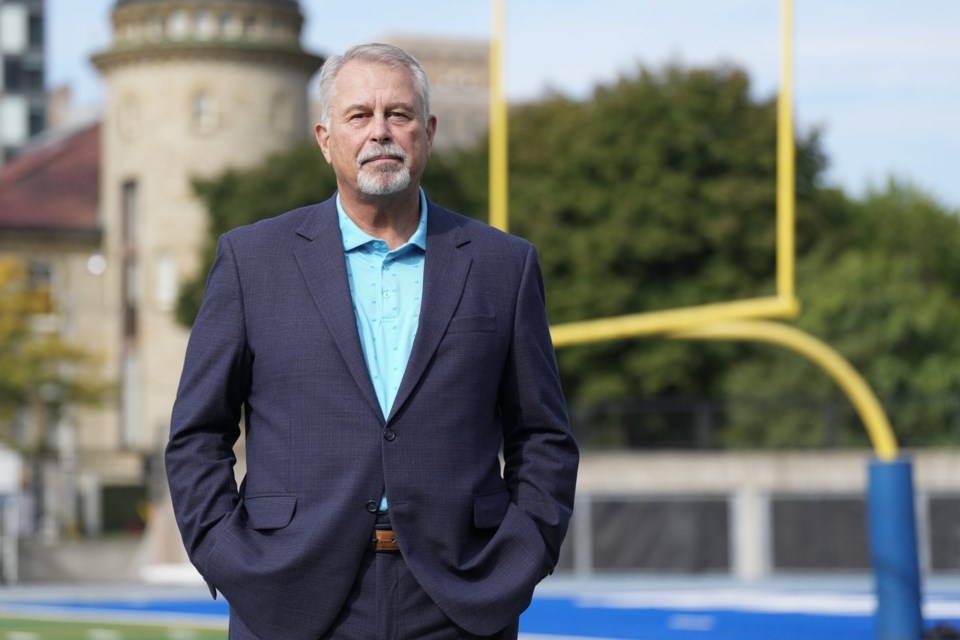TORONTO — Neil Lumsden has signed his organ donor card for decades, so the decision to do his part for concussion research was a no-brainer.
Lumsden, Ontario's Minister of Sport, announced Wednesday he will donate his brain to the Concussion Legacy Foundation Canada (CLFC) to assist with research on brain injuries. Lumsden made the declaration on the football field at Varsity Stadium, appropriate given Lumsden's long and decorated career in the sport.
"I'm privileged to have had a long career playing a high-collision sport and I'm fortunate to have not experienced the negative, long-term affects of concussions," Lumsden said. "But many of my teammates and others I've played with and against haven't been so lucky.
"Why have I been immuned? There's got to be a reason, I want to know what that reason is and more importantly I want the research to find out when the time comes to make things better and safer for those that come (after) me. Both of my kids (son Jesse, daughter Kristine) were involved in sport, contact on all fronts and I want it better for their kids and everyone's kids and grandkids."
Brain donations are important for gaining insight into the prevention, diagnosis, and treatment of chronic traumatic encephalopathy (CTE), a neurodegenerative disease linked to repetitive head trauma.
Lumsden's ministry is also providing up to $52,500 in funding to CLFC, which is partnering with the Centre for Addiction and Mental Health on a research project on traumatic brain injuries.
CLFC executive director Tim Fleiszer, also a former CFL player who's the only one in league history to win four Grey Cups with four different teams, applauded Lumsden for his public declaration.
"It's an enormous boost to what we're doing," Fleiszer said. "The majority of brain injuries go unrecognized, undiagnosed and untreated and we're just starting to understand now the mental-health implications of this.
"One of the fortunate things is because people pay attention to sport, we've been able to raise awareness that this isn't just a sports issue. We've got really important work to do and Minister Lumsden using his platform supporting us with funding for research but also putting this out there so people are becoming more aware of this is a great step."
Lumsden, 71, of London, Ont., won a Vanier Cup with the University of Ottawa in 1975. He went on to play 10 CFL seasons with Toronto (1976-78), Hamilton (1978-79) and Edmonton (1980-85), where he won three Grey Cups.
Lumsden added a fourth CFL title as Hamilton's general manager in 1999, a team Fleiszer was with. Lumsden was inducted into the Canadian Football Hall of Fame in 2014.
"Wanting to make a difference was important," Lumsden said. "When I've broken an arm or blown out an ACL, it's kind of the same for everybody.
"But repeated blows to the head and the results of those are not the same for everyone, not even close. If I can find out why and help someone else through research, why the heck wouldn't I through something that's very important to me, and that is sport, on and off the field?"
Lumsden, who spent upwards of 40 year coaching football and hockey, becomes the latest athlete to pledge their brain to research. That group includes hockey players Hayley Wickenheiser, Cassie Campbell-Pascall and Jonathan Huberdeau, former CFL star receiver Ken Evraire and former Canadian rugby player Jen Kish.
The subject of brain injuries in football took centre stage Thursday night when Miami Dolphins quarterback Tua Tagovailoa suffered a concussion during a running play in the second half of the club's 31-10 loss to the Buffalo Bills.
After being taken down by Buffalo's Damar Hamlin, Tagovailoa hit his head on the ground and struggled to immediately get up. He eventually was able to walk off the field, but the image of a prone Tagovailoa, his arm up in the air, prompted some NFL officials to suggest the former Alabama star should consider retirement following his third concussion since 2022.
Tagovailoa's younger brother, Taulia, is a first-year quarterback with the Ticats.
Jesse Lumsden followed in his father's footsteps into football, winning the '04 Hec Crighton Trophy as Canadian university's top player at McMaster. After a tryout with the NFL's Seattle Seahawks, Lumsden, of Burlington, Ont., played in the CFL with Hamilton (2005-08), Edmonton (2009) and Calgary (2010).
Lumsden also represented Canada internationally in bobsleigh, competing in three Olympics (2010, '14, '18). He's currently the high-performance director of Bobsleigh Canada Skeleton.
Neil Lumsden said his body reminds him daily of his time as a football player. He says there were times when he suffered head trauma on the field but it was never serious enough to force him out of a game or miss significant time away.
"I remember in high school and college getting my bell rung," Lumsden said. "But never knocked out."
And he cited instances in the CFL when if trainers or medical staff members had concerns about a player's mental capacity, they simple took away his helmet so he couldn't return to the field.
"I saw that happen many times," Lumsden said. "Talk about being ahead of the curve.
"In that way I feel fortunate to have been surrounded by people who were a little ahead of the curve."
Lumsden also hopes others will follow his lead.
"I hope this announcement will inspire others in similar paths and similar backgrounds," he said. "I'd also like to urge my colleagues from across the country in the provinces and the federal government to follow Ontario's lead in establishing concussion safety legislation.
"By raising awareness and sparking change at all levels of government, we can ensure a safer future for younger athletes who want to go out and who have the right and deserve the chance to go out and compete and enjoy sport and recreation."
This report by The Canadian Press was first published Sept. 18, 2024.
Dan Ralph, The Canadian Press



